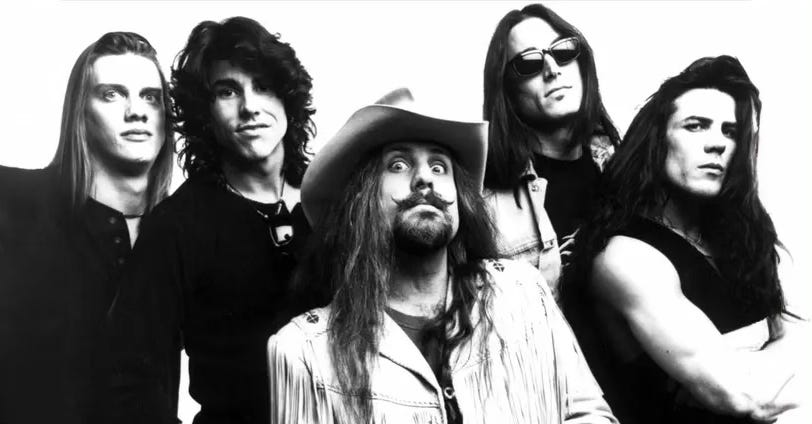Jackyl | History of the Band
Jackyl in the 90s: Defying Trends with Chainsaws and Pure Rock ‘n’ Roll Energy
Jackyl's formation traces back to 1991 in Kennesaw, Georgia, a period bubbling with the raw energy of rock and metal about to explode across the '90s. The band was founded by lead vocalist Jesse James Dupree, alongside guitarist Jeff Worley, bassist Thomas Bettini, and drummer Chris Worley. From the get-go, Jackyl's sound was a gritty blend of hard rock, heavy metal, and a touch of Southern influence, channeling the spirit of their forebears like AC/DC and ZZ Top with a raucous twist that was uniquely their own.
Did this post bring back good vibes?
Musical Style and Evolution
In the early '90s, Jackyl quickly established a reputation for their straightforward, no-frills rock 'n' roll, characterized by loud, energetic music and a flair for the theatrical in live performances. Their style remained relatively consistent throughout the decade, with Dupree often wielding a chainsaw as part of the act, slicing through wooden stools and beer kegs on stage, much to the delight of their growing fan base. This blend of music and mayhem solidified their identity in the rock scene, ensuring their performances were heard and experienced.
Discography and Notable 90s Albums
"Jackyl" (1992) Their self-titled debut album, "Jackyl," released in 1992 under Geffen Records, burst onto the scene with an audacious force. The album featured tracks like "The Lumberjack," where Dupree famously incorporated chainsaw sounds as a musical instrument, a gimmick that became synonymous with the band. The album achieved Platinum status and includes fan favorites like "Down on Me" and "When Will It Rain," capturing their live shows' raw, unpolished energy. This debut effort not only charted on the Billboard 200 but also carved a niche for Jackyl in the crowded rock landscape of the early '90s.
"Push Comes to Shove" (1994) Continuing their partnership with Geffen, Jackyl released "Push Comes to Shove" in 1994. The album didn't replicate the commercial success of their debut but was praised for its robust production and solid rock sensibilities. Tracks like "Headed for Destruction" and the title track, "Push Comes to Shove," showcased the band's ability to meld melodic hooks with hard-hitting rock rhythms, solidifying their place in the rock genre.
Critically, Jackyl has always been a polarizing entity. While some critics dismissed them as mere imitators of their rock predecessors, others lauded their unabashed embrace of rock's fundamental ethos. The band's straightforward approach, eschewing the grunge trends of the time, drew admiration from rock purists and fans who craved the undiluted thrill of '80s-style rock-and-roll in a changing musical landscape.
Hal Phillips suggested this artist for a future Dig Me Out podcast episode. Each month, our Patrons are presented with a selection of albums suggested by listeners and asked to vote for their favorite.
Influence and Legacy
Jackyl's impact in the 1990s may not have revolutionized rock music, but it certainly made a lasting impression on their fans and the live music scene. Their raw energy and uncompromising approach to performance art influenced many smaller bands' live-show tactics. While none of the band members pursued solo careers, their collective persona as Jackyl resonated in rock circles.
Jackyl's journey through the 1990s reflects the era's diverse and sometimes eccentric musical ethos. Although they did not redefine the genre, their contribution lies in their dedication to the fundamental elements of rock music and their memorable, often wild, live performances. In the broader context of 1990s music, Jackyl represents a continuity from the rock of previous decades, reminding us that the spirit of rock 'n' roll not only survived but thrived despite the musical shifts of the decade. Their story, infused with chainsaws and high decibels, is an integral part of the larger narrative of 1990s music. It captures a period where rock was as much about attitude as the music.




I am fairly certain that the original drummer was not Chris Worley! Albeit Worley was the drummer at the onset of the band completing and releasing their debut album. I have reason to believe that the original drummer was one James McMillan! The band is thinking " How the hell does he know that?".